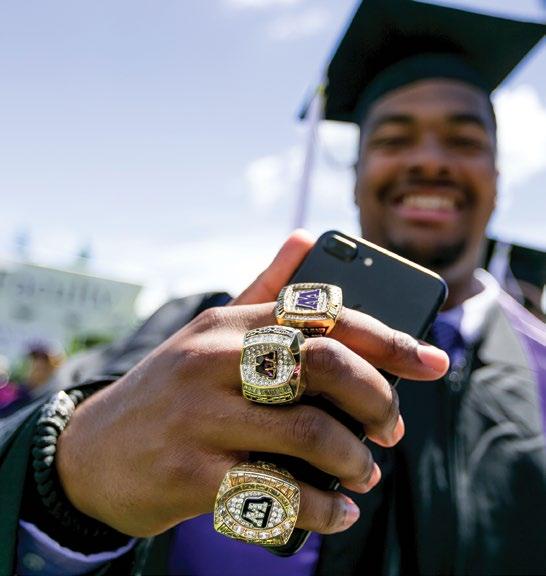
3 minute read
UW Academic Services
Somehow, someway
BY MIKE KORD FOR GOHUSKIES MAGAZINE
Despite the disruptions of a tumultuous year, UW’s academic services team kept student-athletes focused
For many people, 2020 was the most jarring year in recent memory. Anxiety reached new heights as an unpredictable virus spread globally, police clashed with Black Lives Matter protesters in F the streets, and a contentious presidential election hovered just ahead. For Kim Durand, the Senior Associate Athletic Director for Student Development at Washington, 2020 was all that and more.
More because there were student-athletes who needed academic support in the form of sound advice, good tutoring, and the mass dispersal of laptops and textbooks to those who didn’t have access to them. And let’s not forget about the perpetuity of Zoom conferences. Tutoring, study sessions, advising, team meetings, and staff meetings all went virtual, with athletes scattered around the world. The simplicity of face-to-face contact was replaced by the intricacies of exhausting conference calls. It took determination, selflessness, and creative thinking in the face of an uncharted journey with no compass. How do you support student-athletes in a pandemic, anyway?
Durand and the rest of the Student Athlete Academic Services staff figured it out. During the spring quarter, every UW team achieved a GPA of 3.0 or higher. During the 2020 fall quarter, the overall athletic department GPA was 3.42. This was no small achievement. “I can’t think of anything that’s been this extended and unknown, and comprehensive,” Durand said.

Counterintuitively, the unknown can be a blessing. Remember March 2020? Had anyone known then the extent to which the virus would upend daily routines, the psychological impact almost certainly would have struck more fiercely. “At the time, it was new and different,” Durand said. “And I think we had a short-term view of it.”
Some student-athletes were on spring break and thought they would be back on campus in a week. The baseball team was at Sea-Tac Airport, ready to board a plane for its Pacific-12 Conference opener at USC. “I had to call them and say, ‘I know you’re checked in for that flight, but you’re not going,’ ” Durand said.
Athletes were pulled off the track during practice at the NCAA Indoor Track and Field Championships in Albuquerque, New Mexico. A lifetime of dedication led up to that event, only to have a dream snuffed out in an instant. “There were definitely those devastating moments,” Durand said. The moments continued. For athletes and staff, the rhythm of daily life was displaced by a new, vaguely familiar reality—as if each day were a bizarre recurring dream.
Without the collaboration of athletes, staff members, coaches, and administrators, staying focused was more challenging than ever. That’s what makes Durand grateful: To the staff members who often put their personal concerns aside to assist their student-athletes; the coaches who would cover a study hall so staff members could take a break; the administrators who made the decision to ship textbooks and laptops across the country; and the student-athletes themselves.
One would get an A on a paper. Another would start showing more independence. Not only did each of these small milestones lead to the department’s academic success, but they also gave a weary staff the right dose of positive reinforcement. “It just seemed that somehow, some way,” Durand said, “the right student-athlete that inspires you and keeps you going would miraculously appear when we needed it most.”
The team’s efforts were not lost on UW’s student-athletes. “They literally give their time and space to us athletes to get better and just be there when we need them,” said Sami Reynolds, an outfielder on the Husky softball team. “I know that I have the resources if I ever need help in something. They’re awesome. I love them.”







